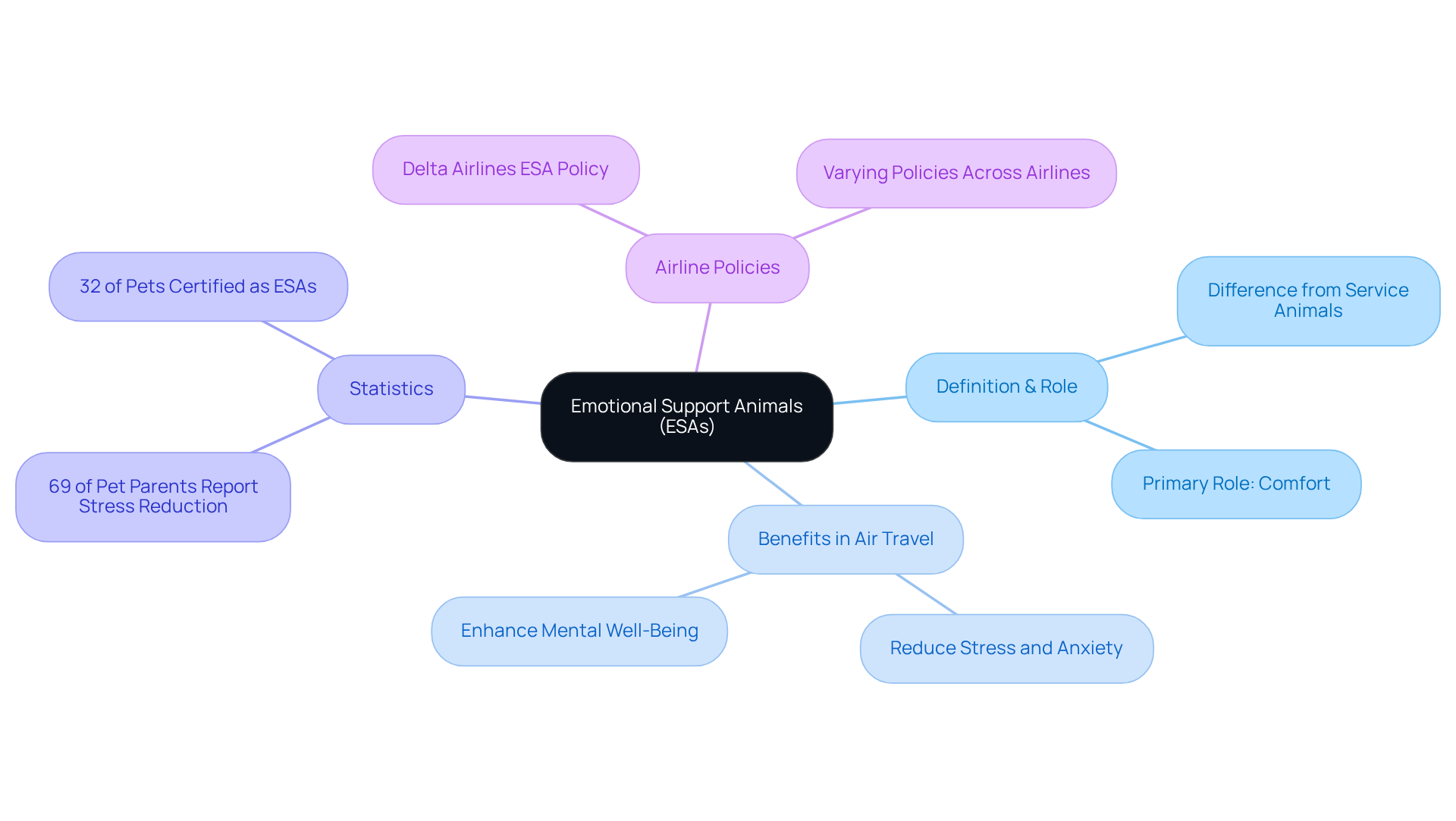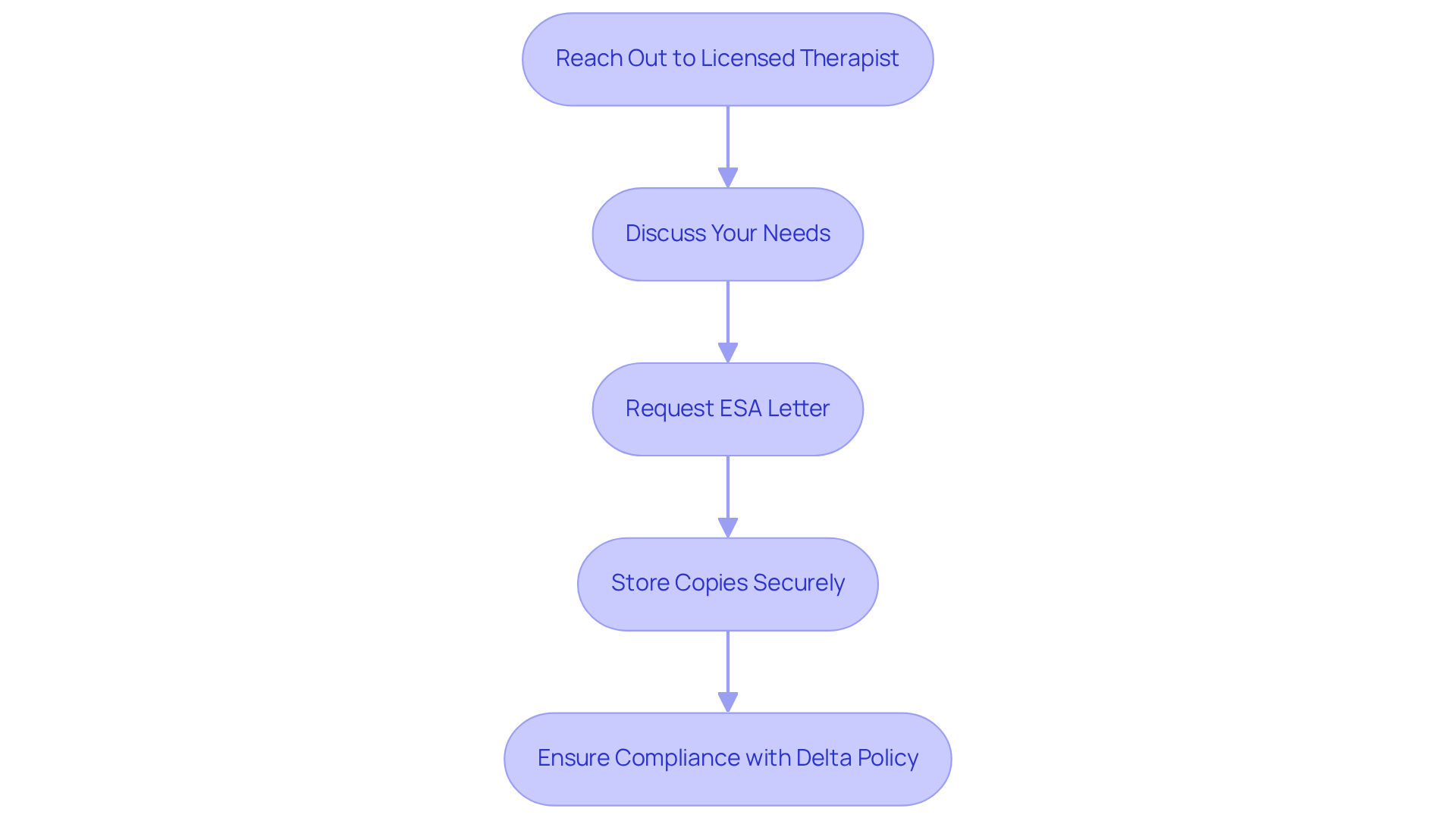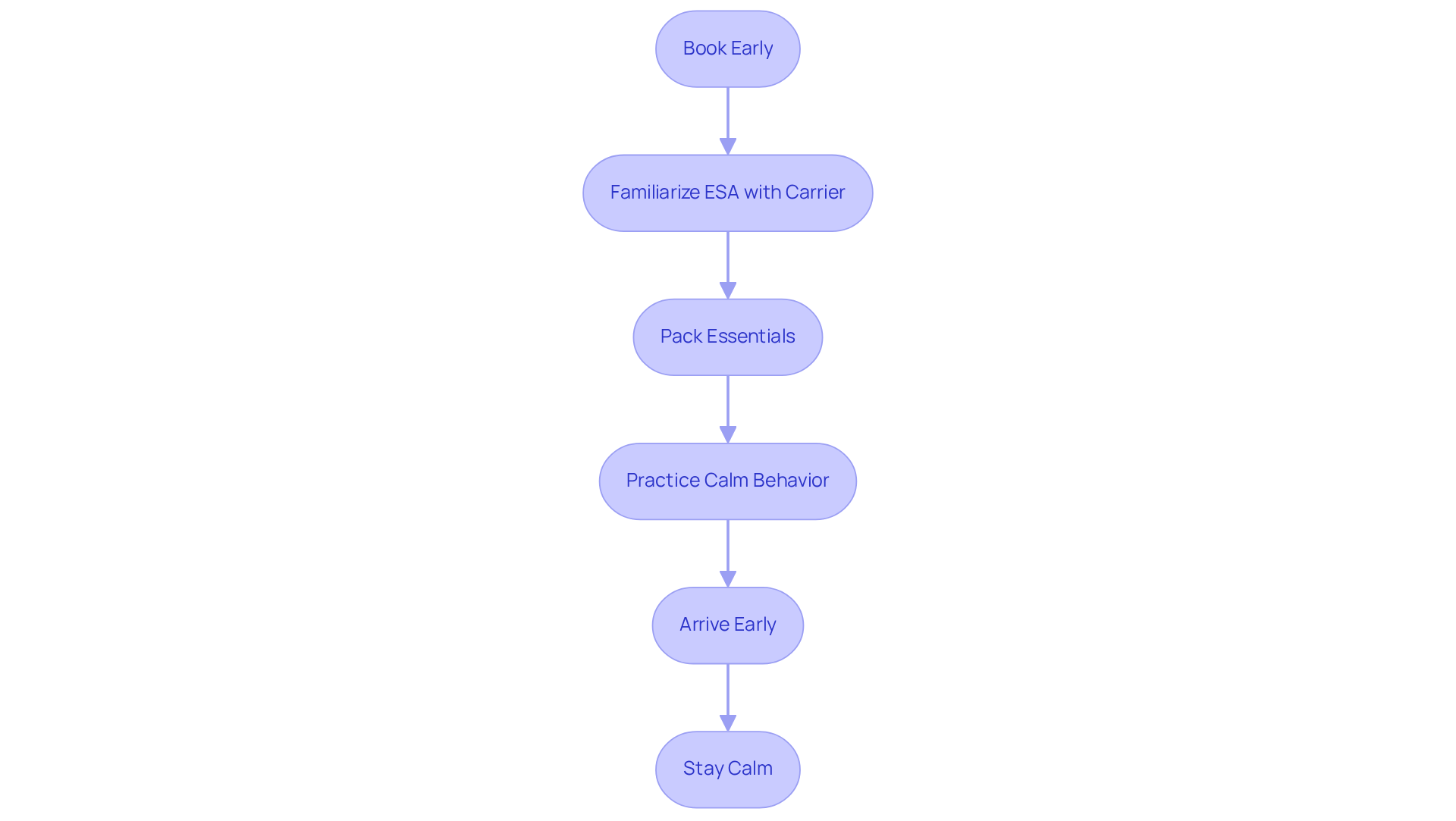

Navigate Delta Airlines ESA Policy for Stress-Free Travel
by Lena Park
Last updated: July 10, 2025
Verified and Approved by:
Angela Morris,
MSW, LCSW
Fact Checked

Overview
The main focus of this article is to offer compassionate guidance on navigating Delta Airlines’ Emotional Support Animal (ESA) policy, ensuring that your travel experience is as smooth as possible. We understand that traveling can be challenging, particularly for those with mental health concerns.
Recently, significant changes have been made to the ESA policy, which now treats ESAs similarly to pets. This shift may bring about some emotional challenges, but we are here to help you understand the requirements for travel, including:
- Carrier specifications
- Necessary documentation
- Behavioral expectations
By outlining these details, we aim to assist you in preparing adequately for your journey with your emotional support companion, ensuring that you feel supported every step of the way.
Introduction
Navigating the complexities of air travel can feel overwhelming, particularly for those who depend on Emotional Support Animals (ESAs) for comfort and companionship. As airlines adapt their policies, it becomes crucial for travelers to grasp the subtleties of Delta Airlines’ ESA guidelines in order to embark on a stress-free journey.
What challenges might arise as you seek to comply with these new regulations? How can you prepare effectively to ensure your beloved companion can accompany you? Understanding these aspects can ease your journey, allowing you to focus on the companionship your ESA provides.
Define Emotional Support Animals and Their Role in Air Travel
Emotional Support Animals serve as vital companions for those navigating emotional or psychological challenges. While service animals are trained to assist individuals with disabilities, emotional support animals do not require specialized training. Their primary role is to offer comfort and alleviate symptoms linked to conditions like anxiety, depression, and PTSD.
For many travelers, emotional support animals can significantly ease the stress and anxiety often associated with flying. The presence of an ESA can enhance mental well-being, providing a sense of calm during what can be a daunting experience. Research reveals that 69% of pet parents feel their pets help reduce stress, highlighting the profound impact these animals can have on emotional health.
However, it’s important to recognize that the Delta Airlines ESA policy is one of the varying policies airlines have regarding emotional support animals. Understanding the Delta Airlines ESA policy is crucial for travelers who wish to benefit from the comfort of their companions during flights.
As you consider the role of an emotional support animal in your life, reflect on the potential for connection and comfort they can provide. Remember, you are not alone in facing these challenges, and support is available to help you through your journey.

Explore Delta Airlines’ Emotional Support Animal Policy and Requirements
Delta Airlines has made significant changes to its delta airlines esa policy, as it no longer recognizes Emotional Support Animals (ESAs) as service animals. As of 2021, according to the delta airlines esa policy, ESAs are treated similarly to pets, which means they must travel in an approved carrier and incur applicable pet fees. This shift has understandably affected many travelers, as the airline’s new regulations require strict adherence to the following guidelines:
-
Carrier Requirements: The ESA must fit in a soft-sided, ventilated carrier that can be placed under the seat in front of the passenger. This ensures the safety and comfort of both the animal and fellow passengers.
-
Documentation: While special documentation is no longer mandatory, it is advisable for travelers to carry their ESA letter from a licensed mental health professional. This document clarifies the animal’s role and may assist in discussions with airline personnel. For those seeking a valid ESA letter, Wellness Wag offers a streamlined consultation process with licensed medical professionals, ensuring you receive your documentation swiftly—typically within 24 hours of approval.
-
Fees: A fee of approximately $95 each way may apply for traveling with an ESA, aligning with Delta’s pet policy. However, fees for traveling with ESAs can exceed $175 each way, according to external sources. Wellness Wag also provides affordable options for obtaining ESA letters, including cashback offers, making the process more accessible.
-
Behavioral Expectations: The ESA must be well-behaved, toilet-trained, and able to remain calm in a public setting. Passengers are responsible for their pet’s behavior during the flight; any disturbances may lead to denial of boarding. Airlines reserve the right to deny access if an ESA causes a disturbance, highlighting the importance of adhering to behavioral standards.
These modifications in the Delta Airlines ESA policy have affected many travelers, especially those who depended on their emotional support companions for comfort during flights. Reports indicate a surge in the number of passengers traveling with ESAs, leading to increased scrutiny and incidents involving these animals. Consequently, the airline has implemented these regulations to enhance safety and ensure a pleasant travel experience for all.
In light of these updates, travelers are encouraged to familiarize themselves with the Delta Airlines ESA policy and prepare accordingly to avoid any disruptions during their journey. If you’re looking to acquire an ESA letter, consider Wellness Wag’s services for a quick and effective process. Visit our website or contact us for more information on how to get started.

Obtain and Prepare Your ESA Letter for Delta Airlines Travel
Traveling with your Emotional Support Animal (ESA) is an important aspect of your mental health journey, especially under the Delta Airlines ESA policy. To ensure a smooth experience, obtaining a valid ESA document from a licensed mental health professional is essential. Here’s how you can navigate this process with care:
-
First, consider reaching out to a licensed therapist or psychiatrist who understands the importance of ESAs in mental health treatment. During your appointment, take the time to discuss your needs openly. It’s important to share your mental health condition and how your ESA supports you in coping. Your honesty and thoroughness in this discussion can truly make a difference.
-
If your professional agrees that an ESA is beneficial for your mental well-being, kindly request a letter that includes key details: your name and the date of the letter, the professional’s name, license number, and contact information, along with a statement confirming your need for an ESA. This letter serves as a compassionate acknowledgment of your journey.
-
Remember to keep several copies of this important document, storing the original in a secure place. You may need to present it at the airport or during your flight, so having duplicates can ease any worries.
-
As we look ahead to 2025, it’s crucial to ensure that your ESA document adheres to the Delta Airlines ESA policy, requiring it to be on official stationery and signed by a licensed mental health professional. Typically, acquiring an ESA document from a licensed therapist takes just a few days to a week, depending on their availability.
Real-life stories show that individuals who follow these steps often find success in obtaining their ESA letters, allowing them to travel comfortably with their emotional support animals. Remember, you are not alone in this journey, and support is available to help you every step of the way.

Implement Best Practices for Traveling with Your ESA on Delta Airlines
Traveling with your Emotional Support Animal (ESA) can be a deeply fulfilling experience, especially when you approach it with thoughtful preparation. Here are some essential best practices to help ensure a smooth and comforting journey on Delta Airlines:
-
First, it’s important to book early. Make sure to inform Delta Airlines of your ESA in accordance with their delta airlines esa policy at least 48 hours before your flight. This advance notice helps facilitate the necessary arrangements, setting the stage for a stress-free experience.
-
Next, familiarize your ESA with the carrier. Allow your furry friend to acclimate to their carrier before the trip. This simple step can significantly alleviate anxiety during travel, making the journey easier for both of you.
-
Don’t forget to pack essentials. Bring along your ESA’s necessities, including food, water, a leash, and any required medications. Having these items readily available can provide comfort during your travels.
-
It’s also beneficial to practice calm behavior. Train your ESA to remain composed in various environments. This practice will aid their adjustment to the airport and airplane settings, helping them feel more at ease.
-
Arriving early is another crucial step. Get to the airport ahead of time to allow for check-in and security procedures. This extra time can help minimize stress for both you and your ESA, ensuring a more pleasant experience.
-
Lastly, remember to stay calm. Your demeanor can greatly influence your ESA’s behavior. By maintaining a calm and reassuring presence throughout the travel process, you can help them feel secure and supported.
Statistics show that a significant percentage of travelers inform airlines about their emotional support animals in advance, which is vital for ensuring compliance with airline policies. Real-life experiences from travelers highlight the importance of these practices, showcasing successful journeys with ESAs as outlined in the Delta Airlines ESA policy. Travel experts consistently emphasize that preparation and a calm approach are key to a stress-free travel experience with your ESA.

Conclusion
Navigating the Delta Airlines ESA policy is essential for travelers who rely on Emotional Support Animals for comfort during flights. Understanding the recent changes and requirements can significantly impact your travel experience. It is crucial to prepare adequately and be aware of the airline’s guidelines, as this directly affects your ability to travel with these vital companions.
This article highlights key aspects of Delta’s policy, including:
- The new treatment of ESAs as pets
- Necessary documentation
- Carrier specifications
- Behavioral expectations
Emphasis is placed on obtaining a valid ESA letter, adhering to travel protocols, and implementing best practices for a stress-free journey. By following these insights, you can enhance your experience and ensure compliance with Delta’s regulations.
Ultimately, your journey with an Emotional Support Animal should be one of comfort and support. By preparing in advance and understanding the specific requirements set forth by Delta Airlines, you can alleviate anxiety and foster a positive environment for both yourself and your ESA. Embrace the opportunity to travel with your emotional support companion while prioritizing their well-being and adhering to airline policies.
Frequently Asked Questions
What are Emotional Support Animals (ESAs)?
Emotional Support Animals are companions that provide comfort and alleviate symptoms related to emotional or psychological challenges, such as anxiety, depression, and PTSD. Unlike service animals, ESAs do not require specialized training.
How do Emotional Support Animals help travelers?
ESAs can significantly ease the stress and anxiety associated with flying, enhancing mental well-being and providing a sense of calm during travel.
What percentage of pet parents feel their pets help reduce stress?
Research shows that 69% of pet parents feel their pets help reduce stress, indicating the positive impact of these animals on emotional health.
What is the Delta Airlines ESA policy?
The Delta Airlines ESA policy outlines the specific regulations and requirements for traveling with emotional support animals. It is important for travelers to understand this policy to benefit from the comfort of their ESAs during flights.
What should I consider when thinking about having an Emotional Support Animal?
Consider the potential for connection and comfort that an ESA can provide in your life, especially if you are facing emotional or psychological challenges.
Certify Your Emotional Support Animal Today

Why You Can Rely on Us?
At Wellness Wag, we believe your pet deserves care rooted in both science and compassion. Each article is carefully researched, written in clear language for pet owners, and then reviewed by qualified professionals to ensure the information is evidence-based, current, and practical for real-life care. Our goal is to help you feel confident in making informed decisions about your pet’s health and well-being.
Reviewed by
Angela Morris, MSW, LCSW
Angela is a licensed clinical social worker with 20 years of experience in patient advocacy and community mental health. She has assisted numerous clients with ESA evaluations and brings a deep understanding of disability accommodations, ensuring that all information is accurate, supportive, and practical.

Written by :
Lena Park
Last Updated :
July 10, 2025












